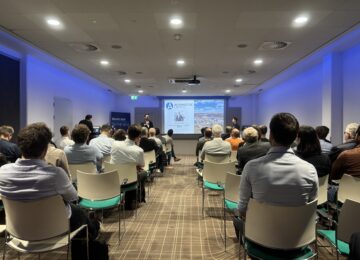ESNL welcomes new board member: Boudewijn den Herder, Essent
Board member Boudewijn den Herder
I am Chief Commercial Officer (CCO) at Essent. After a career at Unilever and Heineken, I have now been working in the energy sector for more than 8 years. In that time a lot has changed enormously.
More and more solar and wind are coming onto the grid, and you never know exactly how much. That's why you need flexibility. Consumers are buying electric cars and they are purchasing heat pumps. Companies are electrifying and increasing their demand. Local generation by households and businesses is increasing accordingly. Both consumption and production are growing and cannot be predicted perfectly, this creates imbalance and an overcrowded grid.
So with large-scale and small-scale energy storage, we are less at risk. Because we can store energy when there is a lot of wind and/or sun, and discharge the battery again when we need it, we avoid having to buy expensive energy. This helps tremendously in keeping energy bills more affordable over time. When there are eventually enough batteries in the high-voltage grid, fossil-fuel power plants can be turned off. So energy storage not only provides benefits for consumers and the grid, but also helps in achieving our climate ambitions.
Despite this great potential, many challenges remain. Calculations show that some 10 gigawatts (=10,000 megawatts) of large-scale battery storage will be needed in the Netherlands by 2030. As it looks now, we will only have realized 1.5% (150 megawatts) by 2023. So we are only at the beginning. Charging and discharging batteries is still too expensive. We need legislation that attracts investment and facilitates the efficient rollout of large-scale batteries. The storage capacity, efficiency and cost of home batteries also does not yet make investment profitable for the masses. While I am personally convinced that we will only really accelerate the energy transition if we can also better control the consumption of individual households.
If it were up to Essent, we would actively pursue all forms of energy storage. By that I mean electrons and molecules. Electrolyser (hydrogen) or heat storage is also of great value in the energy system. For industry and local decentralized systems, we need storage in different forms. An electrolyser can provide hydrogen to industry (locally) when they move away from fossil gas but it can also be a way to convert excess electricity into hydrogen when there is grid congestion. E.ON/Essent has developed Ectogrid™, which is a 5th generation heat grid that provides both heating and cooling at lower temperatures. Heat storage is important in a collective heat and cold system to balance the system and operate without electricity for extended periods of time. By sharing, balancing and storing energy, all available energy flows are used optimally before new energy is added.
Storage in electrons and molecules is thus important at different scales. Local to encourage households to consume more energy when there is enough sustainably generated energy available. Decentralized to develop energy hubs so that business parks and residential areas can more easily become self-sufficient and help reduce grid congestion. And centrally to better capture the volatility of wind and solar so that we can all ultimately have more control and grip on our energy bills.
Boudewijn.den.Herder@essent.nl
Boudewijn den Herder | LinkedIn





